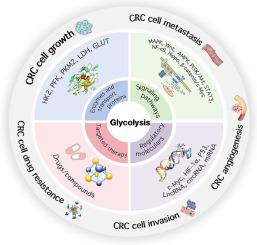葡萄糖代谢重编程在结直肠癌进展和耐药性中的作用
IF 5
2区 医学
Q2 Medicine
引用次数: 0
摘要
大肠癌(CRC)的发病率和死亡率逐年上升,极大地威胁着人们的健康。癌细胞中异常的葡萄糖代谢,尤其是沃伯格效应,被认为是肿瘤发生的一个重要标志。在 CRC 中,沃伯格效应主要通过参与细胞代谢的糖酵解途径影响癌症的发生和发展。这一过程的关键机制包括关键的糖酵解酶、转运蛋白、调节分子和信号通路。此外,针对癌细胞中重新编程的葡萄糖代谢可用于治疗 CRC。然而,驱动 CRC 发病和进展的机制,尤其是与葡萄糖代谢重编程相关的机制,尚未完全明了,是一个新兴的研究领域。本综述旨在就葡萄糖代谢重编程在 CRC 病程进展及其抗药性中的作用提供新的见解。最终,这些见解将有助于降低 CRC 转移和复发的风险。本文章由计算机程序翻译,如有差异,请以英文原文为准。

Role of glucose metabolic reprogramming in colorectal cancer progression and drug resistance
Colorectal cancer (CRC), with the incidence and mortality rising on a yearly basis, greatly threatens people's health. It is considered an important hallmark of tumorigenesis that aberrant glucose metabolism in cancer cells, particularly the Warburg effect. In CRC, the Warburg effect predominantly influences cancer development and progression via its involvement in the glycolytic pathway regarding cell metabolism. The critical mechanisms underlying this process include key glycolytic enzymes, transport proteins, regulatory molecules, and signaling pathways. Furthermore, targeting the reprogrammed glucose metabolism in cancer cells can be potentially used for CRC treatment. However, the mechanisms driving CRC onset and progression, especially in relation to glucose metabolism reprogramming, are not fully understood and represent an emerging field of research. The review aims at providing new insights into the role that glucose metabolism reprogramming plays in the progression of CRC progression together with its resistance to treatment. Ultimately, these insights strive to diminish the risks of CRC metastasis and recurrence.
求助全文
通过发布文献求助,成功后即可免费获取论文全文。
去求助
来源期刊

Translational Oncology
ONCOLOGY-
CiteScore
8.40
自引率
2.00%
发文量
314
审稿时长
54 days
期刊介绍:
Translational Oncology publishes the results of novel research investigations which bridge the laboratory and clinical settings including risk assessment, cellular and molecular characterization, prevention, detection, diagnosis and treatment of human cancers with the overall goal of improving the clinical care of oncology patients. Translational Oncology will publish laboratory studies of novel therapeutic interventions as well as clinical trials which evaluate new treatment paradigms for cancer. Peer reviewed manuscript types include Original Reports, Reviews and Editorials.
 求助内容:
求助内容: 应助结果提醒方式:
应助结果提醒方式:


